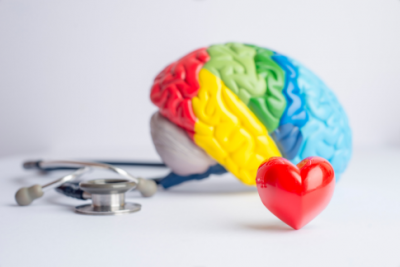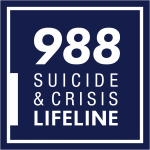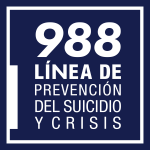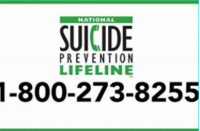Mental Health
Do you need help right now? Contact the suicide prevention 24/7 hotline at 1-800-273-TALK (8255) (or the NEW Suicide Prevention Hotline at 988) or the youth line at 1-877-968-8491
What is mental health?
Mental health is our "emotional, psychological, and social well-being". Our department focuses on promoting good mental health and emotional well-being to improve mental health outcomes and lower stigma related to mental illness.
On this page you will find:
Crisis information
The Mental Health Crisis Response Institute defines a person experiencing a mental health crisis as:
“A state of mind in which they are unable to cope with and adjust to recurrent stresses of everyday living in a functional, safe way.”
Some signs of this are irritability, social withdrawal, anxiety, fatigue, extreme mood swings, abnormal sleeping/eating habits, etc. Not everyone who goes through a mental crisis has all of the traditional symptoms. They may experience only a few or fall somewhere in the middle.
How do I know if I am having a mental health crisis?
If you are:
- Feeling desperate and hopeless
- Worried you might hurt yourself or someone else, or are having suicidal thought
- Alone with no one to talk to
If you have:
- Made a plan
- The means to hurt yourself or someone else (e.g. pills or a weapon)
- Attempted suicide or hurt yourself before
Get Help Immediately - Call 911
Go to the nearest Emergency Hospital or call the local Emergency Response Service
Shareable Copy of Mental Health Resource List Updated 4/2025 by Health Dept
|
|
Suicide Prevention Hotline 24/7, free and confidential support by professionals. Call: 988 or 1-800-273-8255 Text: 988 Chat online: 988lifeline.org Visit Call 988 for more information |
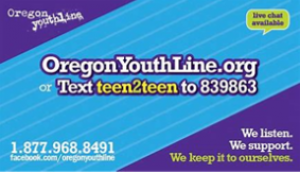 |
Youth Line Teen to teen confidential crisis support by phone, text, online chat, and email. Teens respond Monday-Friday from 4:00pm-10pm PST (adults are available by phone at all other times 24/7!) Call: 1-877-968-8491 Text: 'teen2teen' to 839863 Chat online: oregonyouthline.org Email: Teen2Teen@linesforlife.org Visit oregonyouthline.org for more information. |
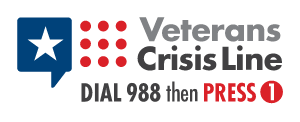 |
Veterans Crisis Line Confidential help for veterans and their families. No need to be enrolled in VA benefits or healthcare. Call: 988 and press 1 Test: 838255 Chat online 24/7, confidential and free: veteranscrisisline.net |
 |
Friendship Line Supports individuals 60+ and adults living with disabilities through crisis intervention and a warm line for non-emergency emotional support calls. Call toll-free: 1-800-971-0016 Need to refer someone for on-going outreach calls? Please call 415-750-4111 and fill out the Friendship Line Intake Form |
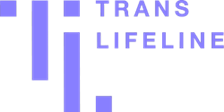 |
Trans Lifeline A trans-led organization that offers crisis and non-crisis support. Trans/non-binary peer support hotline available 24/7 Call: 1-877-565-8860 |
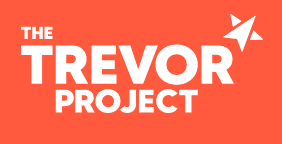 |
The Trevor Project 24/7 confidential and free support for LGBTQ+ (lesbian, gay, bisexual, transgender, queer and more) young people. Call: 1-866-488-7386 Text: 'START' to 678-678 Chat online: thetrevorproject.org |
 |
Friends for Survival, Inc. National support for people who have lost someone to suicide. Call toll free: 1-800-646-7322 |
 |
Crisis Text Line 24/7 professional support for Oregonians who need immediate assistance for behavioral health. Text: ‘OREGON’ to 74174 |
How can I help someone having a mental health crisis?
- Understand that you do not understand - Be empathetic, be sympathetic, listen and really hear your loved one.
- Keep contact at all times - If you feel that someone is a threat to themselves or others (such as having violent and/or suicidal thoughts and actions) always have a way to be reached, in case they need to talk to you. Also, check in with them regularly whether it be in person or just sending them a text saying “hi.”
- Create a network of helpful people - Don’t be the only person with the responsibility of taking care of a loved one. Get a group of friends and/or family members that the loved one you’re helping trusts. Give them multiple people to contact and let them know that they are surrounded by people who care.
- Never hesitate to get professional help - Even if it is against the wishes of the person you are trying to help, call 911 if you think they are in danger. Your number one job is to ensure the safety of your loved one and get them the help they need even if they don’t want it.
- It's not your fault - It is not your responsibility to fix everything, what you do have to offer is your support, love, compassion and understanding.
If you have more questions on helping those in a mental health crisis, you can call the National Suicide Prevention Hotline at 1.800.273.8255 and they can refer you to help in your area. You can find more resources at Born This Way Foundation.
Mental Health Resources
Find a printable/electronic list here
 |
BestCare is Crook County’s designated community mental health provider. BestCare creates a safe, comfortable and familiar environment that helps you make the changes you need to live a life of healthy recovery. BestCare is committed to providing addiction treatment services for adults 18 and over throughout Oregon. Their goal is to help you or a loved one achieve abstinence and independence from addiction while improving the overall quality of life and relationships. I want to.. Contact BestCare -541.323.5330 |

Crook Kids Clinic (a School-Based Health Center operated by Mosaic Medical)
757 E 1st St Prineville, OR 97754
Call 541-383-3005 to Schedule an Appointment
Link to hours of operation and more: https://mosaicmedical.org/location/crook-kids-clinic/
A School-Based Health Center is an independent pediatric healthcare clinic located on school grounds. Currently, Crook Kids Clinic is located on the same block as Grizzly Mountain Homelink and Steins Pillar Elementary off 1 Street. At the Crook Kids Clinic, we offer annual well-child visits along with sports physicals, acute illness treatment, immunizations, specialty referrals, and more. Anyone age 0-18 can be seen at the Crook Kids Clinic, even those without health insurance or healthcare established elsewhere. Walk-in’s and same-day appointments are available.
Find additional mental health providers
The Central Oregon Suicide Prevention Alliance compiles a voluntary Local Mental Health Providers list.
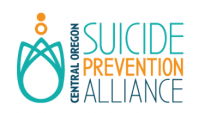 |
Central Oregon Suicide Prevention Alliance (COSPA) The Central Oregon Suicide Prevention Alliance (COSPA) is a regional organization that was created in 2012 through collaborative partnership among public and private organizations in Crook, Deschutes, and Jefferson Counties. COSPA serves all residents in the Central Oregon area. |
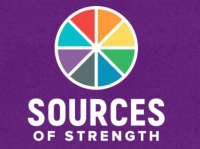 |
Sources of Strengths missions is to: "Provide the highest quality evidence-based prevention for suicide, violence, bullying and substance abuse by training, supporting, and empowering both peer leaders and caring adults to impact their world through the power of connection, hope, help and strength." They have resources for parents, adult leaders and champions, educators, and more. Their site has activities and resources during this time of social and physical distancing due to COVID-19. |
Mental Health Trainings
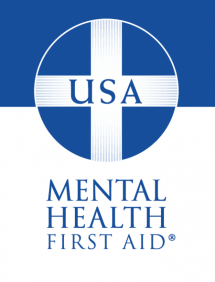 |
Mental Health First Aid Mental Health First Aid is a skills-based training course that teaches participants about mental health and substance-use issues. The evidence behind the program demonstrates that it does build mental health literacy, helping the public identify, understand, and respond to signs of mental illness. This training is typically completed in one day. |
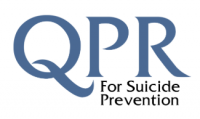 |
Question, Persuade, Refer (QPR) The mission of QPR is to save lives and reduce suicidal behaviors by providing innovative, practical and proven suicide prevention training. We believe that quality education empowers all people, regardless of their background, to make a positive difference in the life of someone they know. Just as people trained in CPR and the Heimlich Maneuver help save thousands of lives each year, people trained in QPR learn how to recognize the warning signs of a suicide crisis and how to question, persuade, and refer someone to help. Each year thousands of Americans, like you, are saying “Yes” to saving the life of a friend, colleague, sibling, or neighbor. QPR can be learned in as little as one hour. |
 |
Applied Suicide Intervention Skills Training (ASIST) ASIST is a two-day, two-trainer, workshop designed for members of all caregiving groups. Family, friends, and other community members may be the first to talk with a person at risk, but have little or no training. ASIST can also provide those in formal helping roles with professional development to ensure that they are prepared to provide suicide first aid help as part of the care they provide. The emphasis is on teaching suicide first-aid to help a person at risk stay safe and seek further help as needed. Participants learn to use a suicide prevention model to identify persons with thoughts of suicide, seek a shared understanding of reasons for dying and living, develop a safeplan based upon a review of risk, be prepared to do follow-up, and become involved in suicde-safer community networks. The learning process is based on adult learning principles and highly participatory. Graduated skills development occurs through mini-lectures, facilitated discussions, group simulations, and role plays. |

